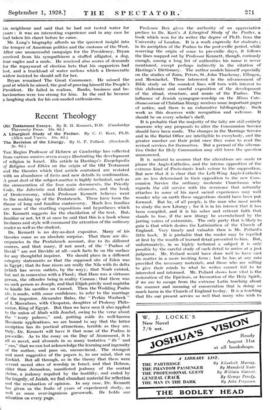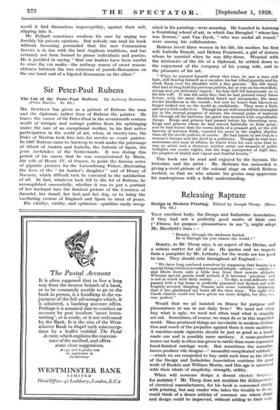Recent Theology
A Liturgical Study of the Psalter. By C. C. Keet, Ph.D. (Allen and Unwin. 10s. 6d.) The Revision of the Liturgy. By G. F. Pollard. (Stockwell. 2s. 6d.)
THE Regius Professor of Hebrew at Cambridge has collected from various sources seven essays illustrating the development of religion in Israel. His article in Hastings's Encyclopedia of Religion and Ethics on the origin of the Old Testament
and the theories which that article contained are restated with an abundance of facts and new details in confirmation. A great deal of the subject-matter is highly technical, such as the enumeration of the four main documents, the Priestly Code, the Jahvistic and Elohistic elements, and the book of Deuteronomy, which Professor Kennett believes went to the making up of the Pentateuch. These have been the theme of long and familiar controversy. Much less familiar are some of the startling expositions and hypotheses which Dr. Kennett suggests for the elucidation of the text. But, familiar or not, let it at once be said that this is a book whose freshness and style will command the attention of the ordinary reader as well as the student.
Dr. Kennett is no dry-as-dust expositor. Many of his theories come as an absolute surprise. That there are dis- crepancies in the Pentateuch account, due to its different sources, and that many, if not most, of the " Psalms of David " are not Davidic at all—such facts lie on the surface for any thoughtful inquirer. We should place in a different category statements as that the supposed site of Eden was in Egypt ; that its four rivers are really the Nile with its delta (which has seven outlets, by the way) ; that Noah existed, but not in connexion with a Flood ; that Ham was a virtuous person, the offender being in reality Canaan ; that there was
no such person as Joseph, and that Elijah privily used naphtha to kindle his sacrifice on Carmel. Then the Wedding Psalm xlv. is made, with some confidence, to refer to the marriage of the impostor, Alexander Balas, the " Perkin Warbeek " of I. Maccabees, with Cleopatra, daughter of Ptolemy Philo- :actor, King of Egypt. But then we have seen it also applied to the union of Ahab with Jezebel, owing to the verse about the " ivory palaces," and, putting aside its well-known Messianic applications, we are bound to say that the latter ascription has its poetical attractions, terrible as they are.
Only, Dr. Kennett will have it that none of the Psalms is pre-exilic. As to the essay on the Day of Atonement, it is all so novel, and abounds in so many tentative " ifs " and " ans," that we can but acknowledge the learning and ingenuity of the author, and pass on, unconvinced. The strongest and most suggestive of the papers is, to our mind, that on Ezekiel. But all through, as in the theory that there were several sacred sites of worship in Israel, and that Hebron, older than Jerusalem, manifested jealousy of the central shrine, a jealousy requited by the hostility, and ended by
the tragedy, of Josiah, we fmd abundant material for reflection and the revaluation of opinion. In any case, Dr. Kennett
has given us the fruits of years of experienced study, as well as some over-ingenious guesswork. He holds our attention on every page.
Professor Box gives the authority of an appreciative preface to Dr. Keet's A Liturgical Study of the Psalter, a book which won for its writer the degree of Ph.D. from the University of London. It is a work expressly for students ; in its ascription of the Psalms to the post-exilic period, while reserving the origin of some to pre-exilic days, it follows the lines mapped out by Professor Kennett, though, curiously enough, among a long list of authorities his name is never mentioned, except perhaps indirectly in the citation of Hastings's Dictionary. The author models himself especially on the studies of Zunz, Peters, St. John Thackeray, Elbogen, and Mowinckel. Those interested in the advancement of Bible study on the soundest lines will turn with interest to this elaborate and careful exposition of the development of the ritual, structure, and music of the Psalms. The influence of Jewish synagogue-worship on the Missa Cate- ehumenortins of Christian liturgy receives some important pages of notice, and there is an exhaustive bibliography. Such work as this deserves wide recognition and welcome. It should be on every scholar's shelf.
It is probable that the majority of the laity are still entirely unaware why any proposals to alter the Communion Service' should have been made. The changes in the Marriage Service and in the Burial Office are intelligible to everybody, and the greater number see their point once they come to read the revised services for themselves. But a perusal of the alterna- tive Order for Holy Communion may still leave the question unanswered.
It is natural to assume that the alterations are made to please the Anglo-Catholics, and the intense opposition of the extreme kind of Protestants lends colour to the supposition. But now that it is clear that the Left-Wing Anglo-Catholics are no less determined in their opposition to the new Com- munion Service the ordinary moderate Churchman who regards the old service with the reverence that naturally attaches to some of his most sacred experiences may well wonder why on earth these suggestions should have been put forward. But he, of all people, is the man who most needs to study the new Liturgy ; for it is in his interest that it has been compiled, and it is his sober and reticent faith that stands to lose, if the new liturgy be overwhelmed by the jarring voices of extremists. The only party that is likely to gain is that which desires the Latinization of the Church of England. Very timely and valuable then is Mr. Pollard's little book. It is probable that the reader may be repelled at first by the wealth of learned detail presented to him. But, unfortunately, in so highly technical a subject it is only possible by the careful study of such detail to arrive at a just judgment. Mr. Pollard would have done well to have cast his matter in a more inviting form ; but he has at any rato provided the necessary materials, and those who are willing to give their minds to what he writes cannot fail to be interested and informed. Mr. Pollard shows how vital is the restoration of the Epiclesis, or Invocation of the Holy Spirit, if we are to escape from the extreme Latin teaching about the manner and meaning of consecration that is doing so much harm in the Church of England to-day. It is a teaching that fits our present service so well that many who wish to
avoid it find themselves imperceptibly, against their will, slipping into it.
Mr. Pollard sometimes weakens his case by urging too forcibly his private opinions. But nobody can read his book without becoming persuaded that the new Communion Service is in line with the best Anglican traditions, and has certainly not been framed to please individuals and parties. He is justified in saying " that our leaders have been careful to steer the via media—the midway course of sweet reason- ableness between the two extremes of pseudo-Romanism on the one hand and of a bigoted Romanism on the other."































 Previous page
Previous page